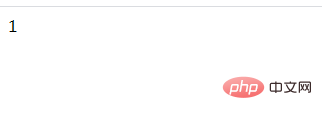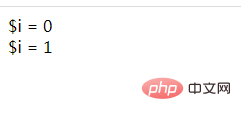How to exit the script program using PHP functions
In the previous article "How to use PHP functions to convert decimal numbers", we learned how to use PHP to convert binary numbers and decimal numbers, decimal numbers and hexadecimal numbers. Interested friends can learn about the mutual conversion of decimal numbers and octal numbers. The focus of this article is "terminate the running of the script and exit the current program"; we need to tell PHP through a statement Engine, other statements after this statement do not need to be executed.
So how can we terminate script execution? In fact, PHP provides two
built-in functions "die()" and "exit()" to complete this operation! Let’s take a look at the following two examples
<?php $a = 1; $b = 9; echo $a; // 输出 1 die(); // 终止脚本运行,下面不在运行 $sum = $a + $b; echo $sum; // 不被输出 ?>
Output results:
<?php $a = 1; $b = 9; echo $a; // 输出 1 exit(); // 终止脚本运行,下面不在运行 $sum = $a + $b; echo $sum; // 不被输出 ?>
 Output results:
Output results: It can be seen that both programs exit (terminate execution) on line 5, and the code on lines 6 and 7 is not executed.
It can be seen that both programs exit (terminate execution) on line 5, and the code on lines 6 and 7 is not executed.
In fact, the two names exit and die point to the same function. die() is an alias of the exit() function. The two functions are essentially the same. And the die() and exit() functions also accept an optional parameter
$message, which is used to output a message when exiting the current script. <div class="code" style="position:relative; padding:0px; margin:0px;"><pre class='brush:php;toolbar:false;'>exit($message);
die($message);</pre><div class="contentsignin">Copy after login</div></div>$message can be a specific value (int type) or a string (String type), or you can enter no parameters.
- If it is of type int, the value will be used as the exit status code and will not be printed. (Exit status codes range from 0 to 254.)
<?php $a = 1; $b = 9; echo $a; // 输出 1 exit(0); // 终止脚本运行,下面不在运行 $sum = $a + $b; echo $sum; // 不被输出 ?>
Copy after login
- If it is a String type, the function will print the string and exit the current script;
<?php header("content-type:text/html;charset=utf-8"); $a = 1; $b = 9; echo $a; // 输出 1 exit("<br>退出脚本"); // 终止脚本运行,下面不在运行 $sum = $a + $b; echo $sum; // 不被输出 ?>Copy after login
 Using this feature, when the program errors, we can pass it a string, which will be output as it is on the system terminal
Using this feature, when the program errors, we can pass it a string, which will be output as it is on the system terminal
$fp=fopen("./readme.txt","r") or die("不能打开该文件");
//这种情况下,如果fopen函数被调用返回布尔值false时,die()将立即终止脚本,并马上打印
//传递给它的字符串,“死前还能说一两句话”。When the value passed to the exit and die functions is 0, it means that the execution of the script is terminated early, usually using the name exit().
When the program errors, you can pass it a string, which will be output as it is on the system terminal, usually using the name die().
die() and exit() functions can be used in loop statements to break out of the loop
<?php
for ($i=0; $i < 10; $i++) {
if ($i == 2) {
die;
} else {
echo '$i = '.$i.'<br>';
}
}
echo '循环外的一个输出<br>';
?>Output result:
 In addition to using the die() and exit() functions, you can also use the
In addition to using the die() and exit() functions, you can also use the
return statement to terminate the program. First we need to know:
. return: Indicates exiting at this point; if it is in a function, it means exiting the function; if it is in a script, it means the script stops executing.
- If called in the global scope, the current script file aborts running. If the current script file is included or required, control is returned to the calling file. In addition, if the current script is included, the return value will be regarded as the return value of the include call, and accordingly a variable is defined in the main script file to receive the return value.
<?php //包含demo13_ stop. php $test = include ' demo13_ stop.php' ; var_ dump($test) ; ?>
Copy after login demo13_stop.php
<?php //终止脚本执行 echo 'start'; //return return '*'; ?>
- If return is called in the main script file, the script stops running.
PHP provides three ways to terminate script execution: return, die(), exit()
return is generally used to end the execution of the current function/file/script/other, and return information to other functions/files/scripts/others that called it.
die() and exit() stop the current execution here and no longer proceed. If there are parameters, they will be printed directly (only for strings).
Then if what you need to output is a numerical variable, you can use
"{}" to wrap the numerical variable: <div class="code" style="position:relative; padding:0px; margin:0px;"><pre class='brush:php;toolbar:false;'><?php
$a = 1;
$b = 9;
exit("{$a}"); // 终止脚本运行,下面不在运行
$sum = $a + $b;
echo $sum; // 不被输出
?></pre><div class="contentsignin">Copy after login</div></div>The output result is:
1
Okay, that’s all. If you want to know anything else, you can click this. → →php video tutorial
The above is the detailed content of How to exit the script program using PHP functions. For more information, please follow other related articles on the PHP Chinese website!

Hot AI Tools

Undresser.AI Undress
AI-powered app for creating realistic nude photos

AI Clothes Remover
Online AI tool for removing clothes from photos.

Undress AI Tool
Undress images for free

Clothoff.io
AI clothes remover

AI Hentai Generator
Generate AI Hentai for free.

Hot Article

Hot Tools

Notepad++7.3.1
Easy-to-use and free code editor

SublimeText3 Chinese version
Chinese version, very easy to use

Zend Studio 13.0.1
Powerful PHP integrated development environment

Dreamweaver CS6
Visual web development tools

SublimeText3 Mac version
God-level code editing software (SublimeText3)

Hot Topics
 1385
1385
 52
52
 PHP 8.4 Installation and Upgrade guide for Ubuntu and Debian
Dec 24, 2024 pm 04:42 PM
PHP 8.4 Installation and Upgrade guide for Ubuntu and Debian
Dec 24, 2024 pm 04:42 PM
PHP 8.4 brings several new features, security improvements, and performance improvements with healthy amounts of feature deprecations and removals. This guide explains how to install PHP 8.4 or upgrade to PHP 8.4 on Ubuntu, Debian, or their derivati
 How To Set Up Visual Studio Code (VS Code) for PHP Development
Dec 20, 2024 am 11:31 AM
How To Set Up Visual Studio Code (VS Code) for PHP Development
Dec 20, 2024 am 11:31 AM
Visual Studio Code, also known as VS Code, is a free source code editor — or integrated development environment (IDE) — available for all major operating systems. With a large collection of extensions for many programming languages, VS Code can be c
 7 PHP Functions I Regret I Didn't Know Before
Nov 13, 2024 am 09:42 AM
7 PHP Functions I Regret I Didn't Know Before
Nov 13, 2024 am 09:42 AM
If you are an experienced PHP developer, you might have the feeling that you’ve been there and done that already.You have developed a significant number of applications, debugged millions of lines of code, and tweaked a bunch of scripts to achieve op
 How do you parse and process HTML/XML in PHP?
Feb 07, 2025 am 11:57 AM
How do you parse and process HTML/XML in PHP?
Feb 07, 2025 am 11:57 AM
This tutorial demonstrates how to efficiently process XML documents using PHP. XML (eXtensible Markup Language) is a versatile text-based markup language designed for both human readability and machine parsing. It's commonly used for data storage an
 Explain JSON Web Tokens (JWT) and their use case in PHP APIs.
Apr 05, 2025 am 12:04 AM
Explain JSON Web Tokens (JWT) and their use case in PHP APIs.
Apr 05, 2025 am 12:04 AM
JWT is an open standard based on JSON, used to securely transmit information between parties, mainly for identity authentication and information exchange. 1. JWT consists of three parts: Header, Payload and Signature. 2. The working principle of JWT includes three steps: generating JWT, verifying JWT and parsing Payload. 3. When using JWT for authentication in PHP, JWT can be generated and verified, and user role and permission information can be included in advanced usage. 4. Common errors include signature verification failure, token expiration, and payload oversized. Debugging skills include using debugging tools and logging. 5. Performance optimization and best practices include using appropriate signature algorithms, setting validity periods reasonably,
 PHP Program to Count Vowels in a String
Feb 07, 2025 pm 12:12 PM
PHP Program to Count Vowels in a String
Feb 07, 2025 pm 12:12 PM
A string is a sequence of characters, including letters, numbers, and symbols. This tutorial will learn how to calculate the number of vowels in a given string in PHP using different methods. The vowels in English are a, e, i, o, u, and they can be uppercase or lowercase. What is a vowel? Vowels are alphabetic characters that represent a specific pronunciation. There are five vowels in English, including uppercase and lowercase: a, e, i, o, u Example 1 Input: String = "Tutorialspoint" Output: 6 explain The vowels in the string "Tutorialspoint" are u, o, i, a, o, i. There are 6 yuan in total
 Explain late static binding in PHP (static::).
Apr 03, 2025 am 12:04 AM
Explain late static binding in PHP (static::).
Apr 03, 2025 am 12:04 AM
Static binding (static::) implements late static binding (LSB) in PHP, allowing calling classes to be referenced in static contexts rather than defining classes. 1) The parsing process is performed at runtime, 2) Look up the call class in the inheritance relationship, 3) It may bring performance overhead.
 What are PHP magic methods (__construct, __destruct, __call, __get, __set, etc.) and provide use cases?
Apr 03, 2025 am 12:03 AM
What are PHP magic methods (__construct, __destruct, __call, __get, __set, etc.) and provide use cases?
Apr 03, 2025 am 12:03 AM
What are the magic methods of PHP? PHP's magic methods include: 1.\_\_construct, used to initialize objects; 2.\_\_destruct, used to clean up resources; 3.\_\_call, handle non-existent method calls; 4.\_\_get, implement dynamic attribute access; 5.\_\_set, implement dynamic attribute settings. These methods are automatically called in certain situations, improving code flexibility and efficiency.




